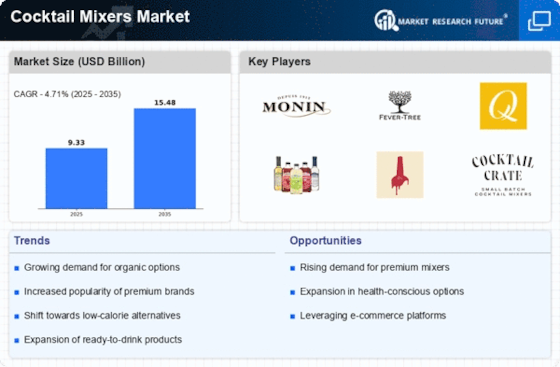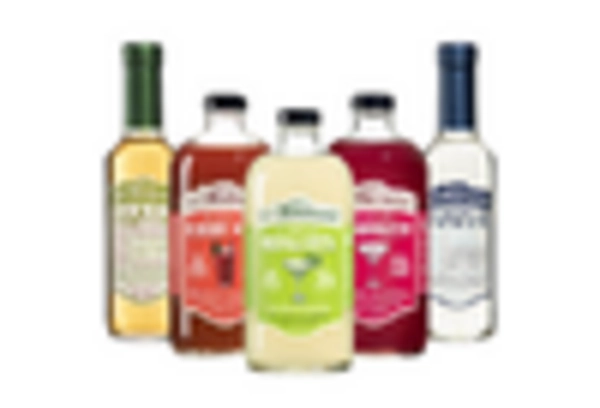Market Share
Cocktail Mixers Market Share Analysis
Tonic water, a carbonated beverage known for its distinctive bitter taste derived from quinine, has evolved beyond its traditional flavor profile. While the bitterness of quinine remains a defining characteristic, the dynamic nature of the market has led to variations in taste across different brands. The quality of ingredients, specific recipes, and innovative approaches have contributed to a spectrum of flavor profiles within the tonic water category.
Diversity in flavor has become a key theme in the tonic water market, responding to the increasing demand from consumers for novel and exciting taste experiences. Various brands have introduced flavored tonic waters, offering an array of options beyond the classic bitter taste of quinine. These flavored variants may feature pronounced citrus or botanical notes, providing a different sensory experience. Some brands may lean towards sweeter or milder profiles, catering to a spectrum of taste preferences in the consumer base.
The infusion of fruit or herbal extracts has further expanded the flavor possibilities within the tonic water landscape. Brands are exploring combinations such as cucumber, elderflower, lemon, and berries, adding a layer of complexity and uniqueness to their offerings. This diversification aligns with the evolving preferences of consumers who seek a broader range of options in the beverages they consume.
The pursuit of new and exciting flavors has prompted key players in the tonic water market to invest significantly in research and development. This commitment to innovation serves as a strategic approach to staying connected with the target audience and meeting the ever-changing expectations of consumers. As a result, the market is witnessing a continuous influx of new products and flavor variations, providing consumers with a rich tapestry of choices.
One notable example of this trend is the recent release of organic tonic water in the UK by Gloucestershire Farm in May 2022. This new entrant into the market offers flavors such as cucumber, wild elderflower, and Damascena rose, showcasing the industry's responsiveness to the demand for unique and organic options. The introduction of such products not only contributes to market growth but also reflects the industry's commitment to sustainability and consumer-driven innovation.
The flavored tonic water market has experienced a substantial surge in demand, particularly in regions like the United States and Europe. This surge can be attributed to the increasing popularity of gin and tonic cocktails, a classic pairing where tonic water plays a central role. Consumers, especially those seeking enhanced cocktail experiences, have expressed a desire for more interesting and unique flavor profiles in their tonic water.
Traditional flavors like lemon and lime, while still popular, are now accompanied by a growing demand for exotic and innovative options. Flavors such as grapefruit, elderflower, and cucumber have gained prominence, offering consumers a broader spectrum of choices to elevate their beverage experiences. Many tonic water brands have responded effectively to this trend, introducing new flavors and expanding their product lines to cater to the evolving preferences of consumers.
In conclusion, the flavored tonic water market represents a dynamic and evolving segment within the beverage industry. The diversification of flavor profiles, driven by consumer demand for novelty and uniqueness, has transformed tonic water into a versatile and exciting category. The industry's commitment to research and development, as exemplified by the introduction of organic and creatively flavored products, underscores a strategic approach to staying ahead in a competitive market. As consumers continue to explore diverse tastes, the flavored tonic water market is poised for sustained growth, offering an ever-expanding array of options for those seeking a more vibrant and personalized beverage experience.


















Leave a Comment